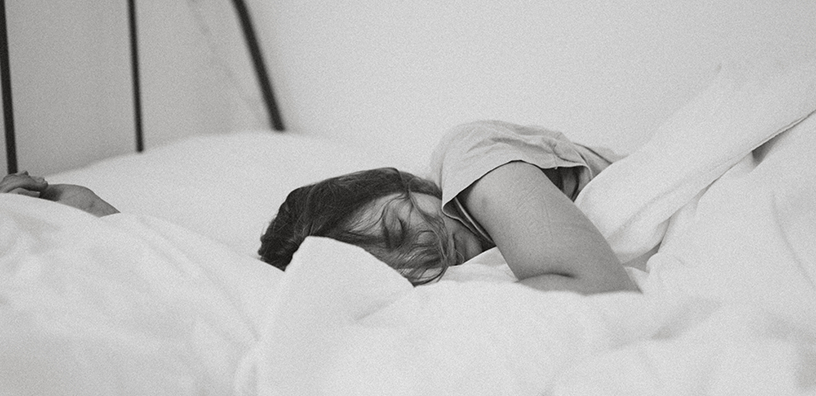
What is REM Sleep?
During sleep, the brain and body are not idle. In fact, they are incredibly active, especially during REM sleep. Chances are, you’ve never heard of REM. However, REM sleep is a crucial part of our sleep cycle, and understanding what it is and how it works could help you achieve a much better quality of sleep.
Let’s take a look at how REM affects the body, what happens when you don’t get REM sleep, and ways to improve it.
What is REM Sleep?
Rapid Eye Movement, REM for short, is the final stage that humans go through in the sleep cycle.* We’ve done an in-depth article about the sleep cycle and how it works, which you can read here. For now, let’s do a brief overview of the cycle so you have an idea of where REM takes place.
The Sleep Cycle
Stage 1 - This stage is the first and lightest of the four. Here you drift in and out of sleep as your body and mind prepare for deeper stages.*
Stage 2 - In this stage, heart rate and breathing slow down. This is still a light stage of sleep, but if awoken, one can feel groggy and disoriented.*
Stage 3 - During the third stage, the brain produces the slowest waves called Delta waves. This stage is deep enough that sleepers may not notice bright lights or sounds.*
What Role Does REM Play in the Sleep Cycle?
REM is the last stage of the sleep cycle before the cycle either breaks (waking up) or starts from the beginning. This stage can last anywhere from 20-40 minutes, extending as the cycles continue. For instance, the first cycle of REM you experience is typically the shortest. The last cycle before you wake up is the longest.*
This is the state where the most vivid dreaming occurs as your brain is most active. The majority of people have multiple dreams throughout the night, even if they don’t remember them. Scientists don’t know why we dream but speculate that dreams have a hand in problem-solving, memory incorporation, and emotion processing. Just like REM itself, dreams also last longer as the night continues.*
How Does REM Affect the Body?
Ok, we know what REM is, but what is it actually doing to the body? For starters, the eyes move rapidly back and forth, giving REM its moniker. Breathing becomes irregular as the heart rate increases near waking levels. Blood pressure also increases and more oxygen is consumed by the brain. Scientists have revealed that during this stage of sleep, the brain exhibits similar activity to waking brain function. Along with the eyes, the face and limbs twitch as well.*
The twitching of the body is usually very mild, as most people experience a form of temporary paralysis that “turns off” the muscles. This is to protect the body from physically acting out dreams.*

In addition to physical actions, the brain does some very important tasks during REM. Studies have suggested a link between REM sleep and memory. Experiments done on sleep-deprived rats showed a decrease in the number of cells created for storing long-term memories. While both REM and Non-REM sleep are important, REM gives the body a chance to organize and store information.*
Not only are memories being developed during REM, but so is the central nervous system. Scientists have discovered that this stage of sleep is extremely important to the nervous system development of infants. In fact, infants spend more time in sleep than adults which can be connected to their need to develop their bodies.*
What happens If You Don’t Get REM Sleep?
Losing sleep can be detrimental to your health, both in the short term and long term. Short term effects of sleep deprivation include cognitive slowness, impaired vision, high blood pressure, increased food cravings, and decreased athleticism.*

In the long term, hearing loss, skin conditions, weight gain, and even serious illness are a huge threat. Think of it this way. Your body uses sleep to regenerate vital cells, repair muscles and tissues, and consolidate memories. Sleep is crucial to keeping your body in perfecting working order. Without sleep, your body would be unable to maintain all the systems that make living possible.*
REM Sleep Disorders
There is really only one sleep disorder that specifically targets REM. REM Sleep Behavior Disorder (RBD) affects the body’s ability to go into temporary paralysis during the REM cycle. Those who suffer from this disorder may attempt to act out their dreams through walking, kicking, yelling, or other behaviors.*

For most, it is unlikely that this disorder will develop. However, it is important to be aware of the factors that increase risk. Taking certain medications, withdrawal from drugs or alcohol, and the development of a neurodegenerative disorder like dementia or sleep disorder like narcolepsy can all lead to RBD.*
How to Get the Most Out of REM Sleep
When it comes to sleep, the more you get the better. This is especially true for REM. As we said, this is your body’s time to repair. Here are a few tips for getting the most effective sleep!
- Avoid stimulants before bed. Coffee and cigarettes are just two stimulants that inhibit melatonin production and make getting to sleep more difficult.*
- Get yourself into a routine. The human body thrives off routine, so sticking to a specific bedtime every night will allow the body to naturally prepare for bed.
- Remove electronics from your bedroom. Phones, tablets, laptops, and other devices emit a harsh blue light that has been shown to hinder melatonin production.* It’s also a major distraction for the brain. Power down an hour before bedtime to allow for your brain and body to get sleepy.
- Invest in effective bedding. Most people don’t realize how important bedding is when it comes to sleep. We highly recommend bamboo viscose bed sheets for optimal sleep. Bamboo viscose has been shown to be cooler than cotton, allowing better airflow and wicking away moisture from the skin. Its natural hypoallergenic qualities resist odors, stains, and common non-living allergens giving you a clean, healthy sleep. Check out our Luxury Bed Sheets here!
We've gone ahead & enclosed a 10% off coupon below for you to use if you'd like to take the plunge and try out our sheets for yourself! To shop our collection & get 10% OFF Use the code 'BLOG10' at checkout.
Resources:
Van Dongen, H. P., Maislin, G., Mullington, J. M., & Dinges, D. F. (2003). The cumulative cost of additional wakefulness: dose-response effects on neurobehavioral functions and sleep physiology from chronic sleep restriction and total sleep deprivation. Sleep, 26(2), 117–126. https://doi.org/10.1093/sleep/26.2.117.
Dinges, D. F., Pack, F., Williams, K., Gillen, K. A., Powell, J. W., Ott, G. E., Aptowicz, C., & Pack, A. I. (1997). Cumulative sleepiness, mood disturbance, and psychomotor vigilance performance decrements during a week of sleep restricted to 4-5 hours per night. Sleep, 20(4), 267–277.
Chapter 30: Sleep. (2021, July 6). Grossmont College. https://socialsci.libretexts.org/@go/page/12428.
Dimitriu, A. (2018, July 26). Am I sleep-deprived and tired – or depressed? PRWeb. Retrieved from https://www.prweb.com/releases/am_i_sleep_deprived_and_tired_or_depressed/prweb15642255.htm.
Frothingham, S. (2019, May 24). Is 5 hours enough sleep? how much sleep should I get? Healthline. Retrieved from https://www.healthline.com/health/is-5-hours-enough-sleep.
ScienceDaily. (2020, June 5). Memory consolidation during REM sleep. ScienceDaily. Retrieved from https://www.sciencedaily.com/releases/2020/06/200605105359.htm#:~:text=The%20presence%20of%20dreaming%20during,memory%20consolidation%20during%20REM%20sleep.
Nunez, K. (2020, July 20). Why do we sleep? Healthline. Retrieved from https://www.healthline.com/health/why-do-we-sleep.
The best temperature for sleep: Advice & tips. Sleep Foundation. (2022, March 11). Retrieved from https://www.sleepfoundation.org/bedroom-environment/best-temperature-for-sleep.

